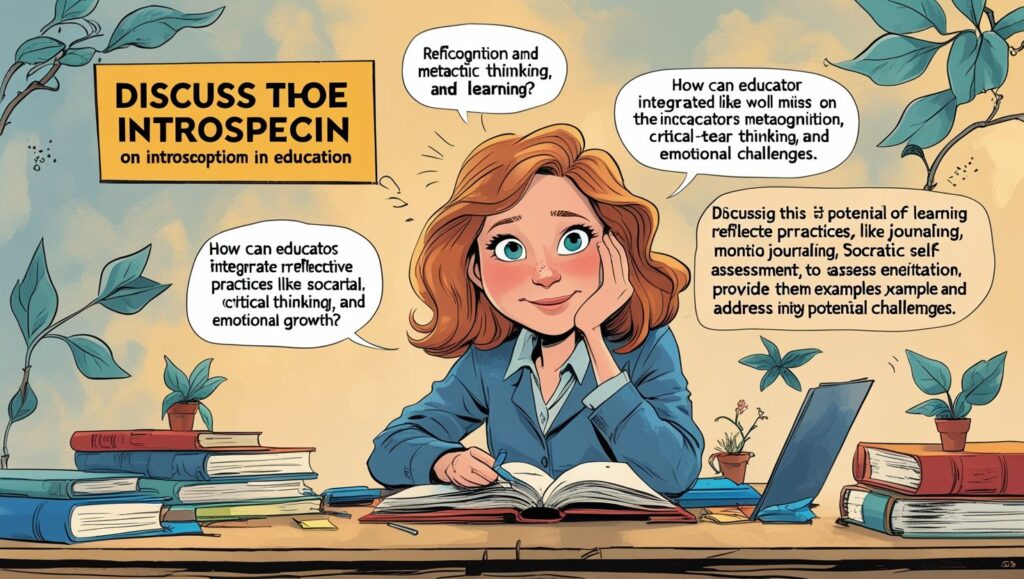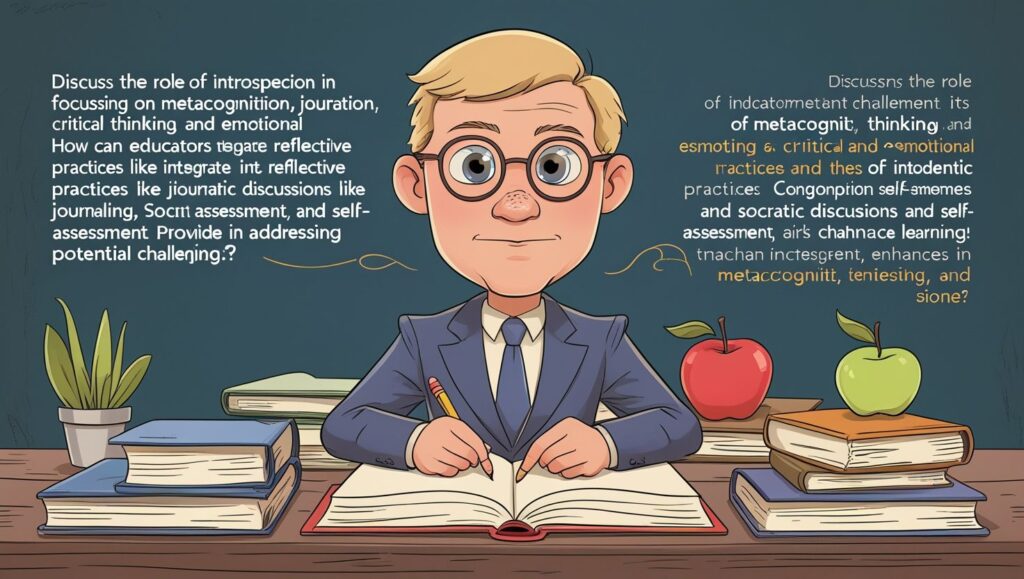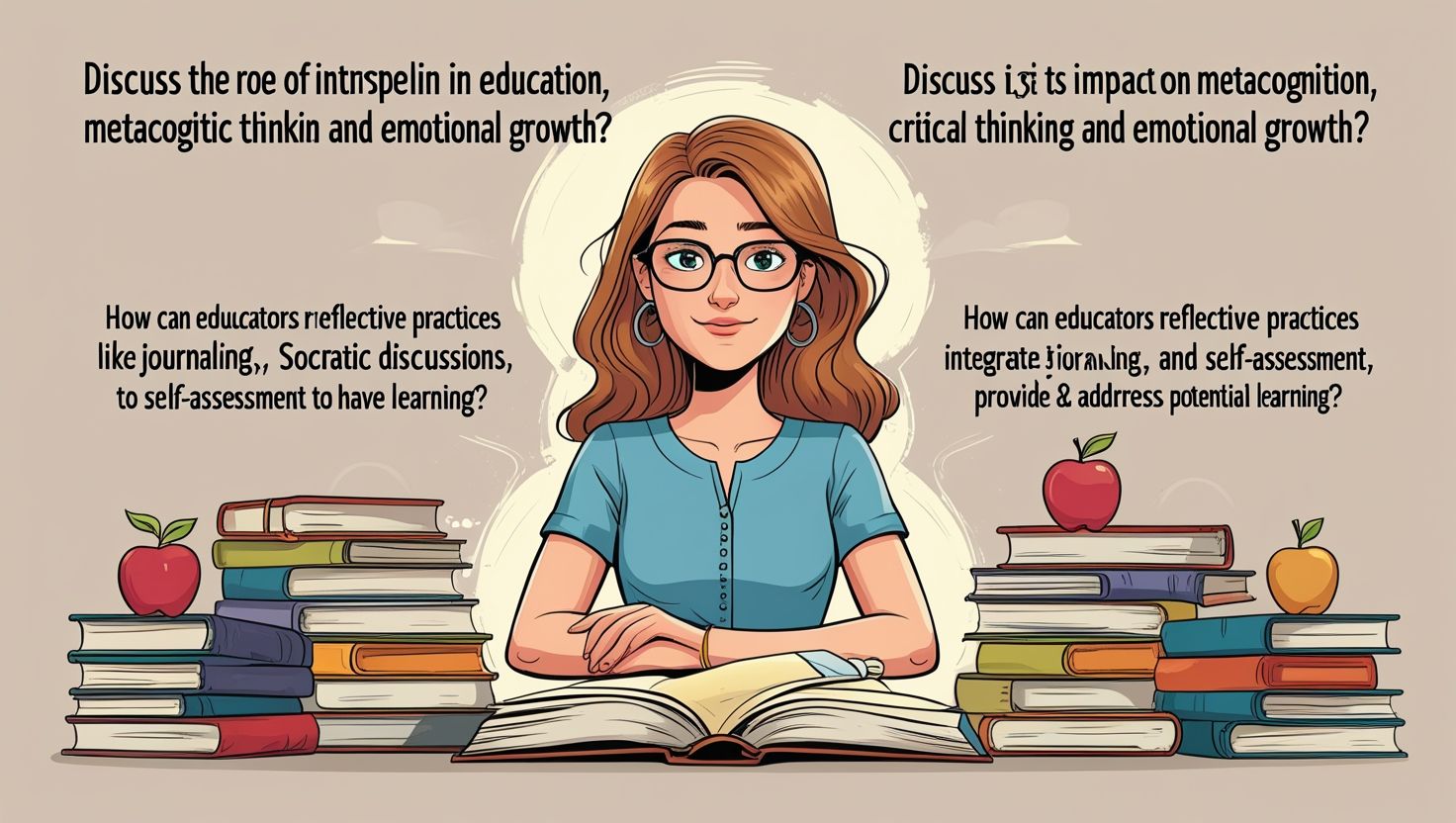Introduction
The Role of Introspection in Education, Introspection, the process of self-examination and reflection on one’s thoughts, emotions, and experiences, has long been a cornerstone of personal and intellectual growth. In education, introspection plays a crucial role in deepening understanding, enhancing critical thinking, and fostering emotional intelligence. While modern education systems often emphasize external assessments and standardized learning, the practice of introspection offers a counterbalance by encouraging students and educators alike to engage in meaningful self-analysis.
This article explores the role of introspection in education, examining its historical significance, psychological and cognitive benefits, practical applications in teaching and learning, and its relevance in contemporary educational frameworks. By understanding how introspection enhances learning, educators can cultivate more mindful, self-aware, and intellectually engaged students.
Historical Perspectives on Introspection in Education
The concept of introspection dates back to ancient philosophical traditions. Socrates famously declared, “The unexamined life is not worth living,” emphasizing the importance of self-reflection in intellectual and moral development. Similarly, Eastern philosophies, such as Buddhism and Confucianism, have long valued meditative and reflective practices as pathways to wisdom.
In the early 20th century, educational theorists like John Dewey advocated for reflective thinking as a key component of learning. Dewey believed that education should not merely transmit knowledge but should encourage students to question, analyze, and internalize information. His progressive education model highlighted the importance of experiential learning, where introspection helps students derive meaning from their experiences.
Despite its philosophical roots, introspection faced criticism in the mid-20th century with the rise of behaviorism, which dismissed internal mental processes as unobservable and irrelevant. However, the cognitive revolution in psychology later reaffirmed the importance of self-reflection in learning, leading to modern educational approaches that integrate metacognition (thinking about one’s thinking) as a vital skill.

Psychological and Cognitive Benefits of Introspection in Learning
1. Enhances Metacognition
Metacognition, or the awareness of one’s thought processes, is essential for effective learning. Introspection allows students to evaluate their understanding, identify gaps in knowledge, and adjust their learning strategies accordingly. For example, a student reflecting on why they struggled with a math problem may realize they need to review foundational concepts before moving forward.
2. Promotes Critical Thinking
Introspection encourages deeper analysis rather than passive memorization. When students reflect on what they’ve learned, they engage in higher-order thinking, making connections between ideas and questioning assumptions. This habit fosters independent, analytical minds capable of innovative problem-solving.
3. Improves Emotional Regulation and Resilience
Education is not just about academic success but also emotional well-being. Introspection helps students recognize their emotional responses to challenges, reducing anxiety and improving resilience. For instance, a student who reflects on past failures can develop a growth mindset, viewing setbacks as opportunities for improvement rather than defeats.
4. Strengthens Self-Directed Learning
In an era where lifelong learning is essential, introspection cultivates autonomy. Students who regularly assess their strengths and weaknesses become more proactive in seeking knowledge, setting goals, and managing their educational journeys without excessive external guidance.
Practical Applications of Introspection in Education
1. Reflective Journals and Learning Logs
Many educators encourage students to maintain reflective journals where they document their learning experiences, challenges, and insights. This practice helps consolidate knowledge and track personal growth over time.
2. Socratic Seminars and Discussion-Based Learning
Classroom discussions that prompt students to articulate their thoughts and defend their viewpoints foster introspection. The Socratic method, in particular, stimulates deep reflection through guided questioning.
3. Mindfulness and Meditation in Schools
Some schools incorporate mindfulness exercises to help students develop self-awareness. Short meditation or breathing exercises before lessons can improve focus and emotional regulation.
4. Self-Assessment and Peer Feedback
Encouraging students to evaluate their own work before receiving teacher feedback promotes accountability. Peer reviews also allow students to see different perspectives, further enriching their reflective processes.

5. Project-Based Learning with Reflection Components
After completing projects, students can be asked to reflect on what they learned, what worked well, and what they would do differently. This reinforces experiential learning and continuous improvement.
Challenges and Misconceptions About Introspection in Education
Despite its benefits, introspection in education faces challenges:
- Time Constraints: Standardized curricula often leave little room for reflective activities.
- Cultural Differences: Some educational systems prioritize collective learning over individual reflection.
- Misinterpretation: Introspection is sometimes mistaken for mere daydreaming rather than structured self-analysis.
To overcome these barriers, educators must intentionally design reflection opportunities that align with curricular goals.
Introspection in the Digital Age
With the rise of digital learning, introspection remains relevant. Online discussions, e-portfolios, and AI-assisted self-assessment tools provide new avenues for reflection. However, educators must ensure that technology enhances rather than replaces deep, mindful thinking.
Conclusion
Introspection is a powerful yet often underutilized tool in education. By fostering self-awareness, critical thinking, and emotional resilience, it prepares students not just for academic success but for meaningful, thoughtful lives. As education evolves, integrating structured reflective practices can help create more engaged, independent, and intellectually curious learners. In the words of philosopher Mortimer Adler, “The purpose of learning is growth, and our minds, unlike our bodies, can continue growing as long as we live.” Introspection ensures that this growth is intentional, profound, and lifelong.

Really enjoyed this! Your writing style is so engaging.
This gave me a lot to think about—thank you for sharing your thoughts!
Clear, concise, and super helpful. Great job!”
Bayrampaşa su kaçağı tespiti Su kaçağı, sessiz ve görünmez bir tahribat etkeni olabilir. https://thesovereignstate.org/author/kacak/
Always a pleasure reading your blog. Keep the great content coming!
Thanks for the great read! Very informative and well-written.
Really helpful content — I learned a lot from this!
I have been absent for some time, but now I remember why I used to love this web site. Thanks , I’ll try and check back more frequently. How frequently you update your web site?
купить аккаунт перепродажа аккаунтов
аккаунты с балансом покупка аккаунтов
биржа аккаунтов маркетплейс аккаунтов
аккаунт для рекламы услуги по продаже аккаунтов
купить аккаунт с прокачкой аккаунт для рекламы
биржа аккаунтов https://kupit-akkaunt-top.ru/
площадка для продажи аккаунтов профиль с подписчиками
Online Account Store Secure Account Purchasing Platform
Account Buying Platform Purchase Ready-Made Accounts
Account Exchange Service Account Store
Website for Buying Accounts Account Purchase
Account Market Account Exchange Service
Account Sale Database of Accounts for Sale
Marketplace for Ready-Made Accounts Verified Accounts for Sale
Buy Account Database of Accounts for Sale
Sell accounts Account exchange
Find Accounts for Sale Account Trading Platform
Account trading platform Account Purchase
account buying service account trading platform
guaranteed accounts account selling service
database of accounts for sale account selling platform
account buying service website for buying accounts
profitable account sales accountsmarketbest.com
account trading platform account marketplace
account selling platform accounts for sale
website for selling accounts account purchase
database of accounts for sale website for buying accounts
account buying platform buy and sell accounts
secure account sales https://socialaccountsshop.com/
account exchange service account exchange
buy and sell accounts buy and sell accounts
gaming account marketplace account purchase
sell account secure account sales
account acquisition account purchase
account trading platform account catalog
guaranteed accounts account sale
account sale marketplace for ready-made accounts
account trading sell accounts
purchase ready-made accounts database of accounts for sale
gaming account marketplace sale-social-accounts.org
account trading platform account acquisition
guaranteed accounts account market
social media account marketplace online account store
find accounts for sale sell pre-made account
account acquisition guaranteed accounts
account selling platform https://accounts-offer.org/
buy pre-made account https://accounts-marketplace.xyz
online account store https://buy-best-accounts.org
marketplace for ready-made accounts https://social-accounts-marketplaces.live/
account selling service https://accounts-marketplace.live/
account exchange service https://social-accounts-marketplace.xyz
accounts market https://buy-accounts.space/
marketplace for ready-made accounts https://buy-accounts-shop.pro/
marketplace for ready-made accounts https://buy-accounts.live/
buy pre-made account https://social-accounts-marketplace.live
account trading platform https://accounts-marketplace.online
find accounts for sale https://accounts-marketplace-best.pro
площадка для продажи аккаунтов https://akkaunty-na-prodazhu.pro
маркетплейс аккаунтов https://rynok-akkauntov.top
магазин аккаунтов https://kupit-akkaunt.xyz/
продать аккаунт https://akkaunt-magazin.online/
биржа аккаунтов https://akkaunty-market.live
купить аккаунт kupit-akkaunty-market.xyz
магазин аккаунтов https://akkaunty-optom.live
продать аккаунт online-akkaunty-magazin.xyz
маркетплейс аккаунтов соцсетей магазины аккаунтов
продажа аккаунтов kupit-akkaunt.online
buy fb ad account https://buy-adsaccounts.work
buying facebook accounts https://buy-ad-accounts.click
buy accounts facebook https://buy-ad-account.top/
buy aged fb account facebook ad account for sale
buy a facebook account https://ad-account-buy.top
buy facebook accounts for advertising buy facebook ads manager
facebook ad account buy buy facebook ads manager
buy fb account facebook ad account for sale
buy account facebook ads buy facebook account
buy google ads agency account https://buy-ads-account.top/
buy verified google ads account google ads agency account buy
facebook accounts to buy https://buy-accounts.click
adwords account for sale https://ads-account-for-sale.top
sell google ads account https://ads-account-buy.work
buy google agency account https://buy-ads-invoice-account.top
buy verified google ads account https://buy-account-ads.work
buy google ads agency account https://buy-ads-agency-account.top
google ads account seller https://sell-ads-account.click
buy google ads invoice account https://ads-agency-account-buy.click/
facebook bm buy buy-business-manager.org
adwords account for sale https://buy-verified-ads-account.work
facebook bm for sale https://buy-bm-account.org
buy facebook bm https://buy-business-manager-acc.org/
facebook business manager account buy https://buy-verified-business-manager-account.org
facebook bm buy buy-verified-business-manager.org
verified bm for sale https://business-manager-for-sale.org/
buy verified facebook business manager account https://buy-business-manager-verified.org
buy verified facebook business manager account https://buy-bm.org
facebook business manager buy verified-business-manager-for-sale.org
buy facebook bm https://buy-business-manager-accounts.org
buy tiktok ads https://buy-tiktok-ads-account.org
buy tiktok ads account https://tiktok-ads-account-buy.org
buy tiktok ads accounts https://tiktok-ads-account-for-sale.org
tiktok ads account for sale https://tiktok-agency-account-for-sale.org
tiktok ads account buy https://buy-tiktok-ad-account.org
buy tiktok ads https://buy-tiktok-ads-accounts.org
tiktok ads agency account https://buy-tiktok-ads.org
tiktok ads account buy https://buy-tiktok-business-account.org
tiktok ads account buy https://tiktok-ads-agency-account.org
buy a facebook account sell accounts account catalog
buy aged facebook ads account account trading platform secure account purchasing platform